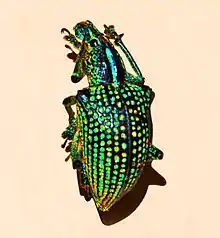Entimus imperialis
Entimus imperialis, common name Brazilian diamond beetle, is a species of broad-nosed weevils belonging to the family true weevil and the Entiminae subfamily.
| Brazilian diamond beetle | |
|---|---|
 | |
| Entimus imperialis from Brazil | |
| Scientific classification | |
| Kingdom: | |
| Phylum: | |
| Class: | |
| Order: | |
| Family: | |
| Genus: | |
| Species: | E. imperialis |
| Binomial name | |
| Entimus imperialis (Forster, 1771) | |
Description
Entimus imperialis can reach a length of about 16–30 millimetres (0.63–1.18 in). The basic colour is black. Elytra are strongly convex and laterally compressed, punctured with longitudinal rows of golden-green dots, filled with scales composed by crystals of chitin and resembling little diamonds (hence the common name). Diamond beetles are also used for ladies' jewelry.
The scales of Entimus imperialis appears iridescent (i.e., exhibit colour changes with viewing angle) because of the presence of three-dimensional photonic crystals. [1][2][3] This characteristics is probably used as a camouflage and to facilitate intersexual recognition.[2]
 Iridescent scales on Entimus imperialis
Iridescent scales on Entimus imperialis Electron micrograph of the three-dimensional photonic crystals within the scales on Entimus imperialis
Electron micrograph of the three-dimensional photonic crystals within the scales on Entimus imperialis
References
- Olivier Deparis and Jean-Pol Vigneron - Modeling the photonic response of biological nanostructures using the concept of stratified medium: The case of a natural three-dimensional photonic crystal, Mater. Sci. Eng. B-Adv. 169, 12–15 (2010).
- Bodo D. Wilts, Kristel Michielsen, Jeroen Kuipers, Hans De Raedt and Doekele G. Stavenga - Brilliant camouflage: photonic crystals in the diamond weevil, Entimus imperialis (29 February 2012)
- Sébastien Mouchet, Jean-François Colomer, Cédric Vandenbem, Olivier Deparis and Jean-Pol Vigneron - Method for modeling additive color effect in photonic polycrystals with form anisotropic elements: the case of Entimus imperialis weevil , Optics Express 21(11), 13228-13240 (2013).